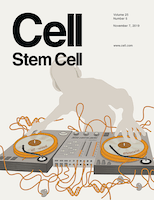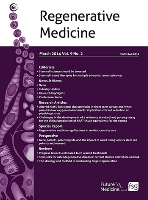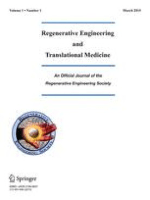
Cell Stem Cell
Scope & Guideline
Exploring Breakthroughs that Shape the Future of Regenerative Medicine
Introduction
Aims and Scopes
- Stem Cell Biology:
The journal emphasizes fundamental research on stem cell characteristics, differentiation pathways, and cellular reprogramming. This includes studies on pluripotent stem cells, multipotent progenitors, and their niche environments. - Regenerative Medicine:
Research focusing on the application of stem cells in regenerative therapies for various diseases is a core aspect, including advancements in tissue engineering and organoid development. - Cancer Stem Cells:
The journal covers the role of stem cells in cancer biology, including the mechanisms of tumor initiation, progression, and resistance to therapies, with a focus on cancer stem cell populations. - Gene Editing and CRISPR Technologies:
Innovative methodologies, particularly CRISPR and other gene-editing tools, are frequently reported, highlighting their applications in modifying stem cell genomes for therapeutic purposes. - Single-Cell and Multi-Omics Approaches:
Cell Stem Cell publishes studies utilizing advanced single-cell technologies and multi-omics analyses to dissect complex cellular behaviors and lineage tracing in stem cell systems. - Translational Research and Clinical Applications:
The journal aims to bridge basic research with clinical applications, showcasing studies that progress towards clinical trials and therapeutic interventions involving stem cells.
Trending and Emerging
- Organoid Technology:
Organoids are increasingly being utilized to model human diseases and developmental processes, allowing for better understanding of complex tissue interactions and drug responses. - Immunotherapy and Stem Cell Engineering:
Research focusing on the integration of stem cell technology with immunotherapy, particularly in cancer treatment, is rapidly expanding, showcasing innovative approaches like CAR-T cell therapies. - Metabolomics in Stem Cell Function:
There is a growing interest in the metabolic regulation of stem cells and its impact on their function and fate, emphasizing the importance of cellular metabolism in stem cell biology. - Age-related Stem Cell Dynamics:
Studies exploring how aging affects stem cell function and regenerative capacity are gaining prominence, reflecting the increasing focus on aging-related research in regenerative medicine. - Synthetic Biology Applications:
The application of synthetic biology principles to engineer stem cells and their niches is emerging as a novel approach, aimed at enhancing stem cell functionality and therapeutic potential. - Single-Cell Genomics and Transcriptomics:
The use of single-cell sequencing technologies to investigate heterogeneity within stem cell populations and their differentiation trajectories is on the rise, providing deeper insights into stem cell biology.
Declining or Waning
- Basic Developmental Biology Studies:
While foundational studies in developmental biology remain essential, there has been a noticeable decline in publications focusing solely on basic developmental processes without direct stem cell applications or implications. - Traditional Tissue Engineering:
Research that employs conventional tissue engineering approaches without incorporating stem cell technology or advanced biomaterials is becoming less frequent, indicating a shift towards more integrative and innovative methodologies. - Non-therapeutic Stem Cell Models:
There seems to be a decreasing interest in studies that utilize stem cells for non-therapeutic modeling purposes, as the field increasingly prioritizes translational research with direct clinical relevance. - Historical Review Articles:
The journal has seen fewer comprehensive review articles that summarize historical perspectives in stem cell research, as the focus has shifted towards presenting novel experimental findings. - Regulatory and Ethical Discussions:
While ethical considerations remain crucial, there has been a reduction in publications dedicated solely to regulatory and ethical debates surrounding stem cell research, as more emphasis is placed on scientific advancements.
Similar Journals

CELLULAR & MOLECULAR BIOLOGY LETTERS
Transforming Knowledge in Biochemistry and Cell BiologyCELLULAR & MOLECULAR BIOLOGY LETTERS, published by BMC, is a premier open-access journal dedicated to disseminating high-quality research in the fields of Biochemistry, Cell Biology, and Molecular Biology. Established in 1996, the journal has emerged as a leader in its domain, boasting an impressive Q1 ranking across three critical categories as of 2023, reflecting its significant impact within the scientific community. With an ISSN of 1425-8153 and an E-ISSN of 1689-1392, it offers accessible research findings to a global audience, having been open access since 2013. Situated in the United Kingdom, at CAMPUS, 4 CRINAN ST, LONDON N1 9XW, the journal continues to serve as a vital resource for researchers, professionals, and students, contributing to advancements in the understanding of cellular and molecular processes. By providing a platform for original research, reviews, and short communications, CELLULAR & MOLECULAR BIOLOGY LETTERS plays a crucial role in fostering dialogue and collaboration within the scientific community.

BIOCELL
Innovative Insights into Cellular MechanismsBIOCELL is a distinguished peer-reviewed journal dedicated to the field of Cell Biology, published by TECH SCIENCE PRESS. Since its inception in 1995, the journal has been at the forefront of disseminating innovative research, with converged publication years extending from 1995 to 2013 and from 2015 to 2024. Although it currently holds a Q4 ranking in the Cell Biology category according to the 2023 category quartiles, BIOCELL aims to foster advancements by providing a platform for researchers, professionals, and students to share their findings in biochemistry, genetics, and molecular biology. The journal is available in both print (ISSN: 0327-9545) and digital formats (E-ISSN: 1667-5746) and seeks to attract contributions that enhance scholarly dialogue and understandings of cellular mechanisms and innovations. With a commitment to quality research and critical discourse, BIOCELL plays an important role in nurturing the scientific community within Argentina and beyond, offering vital insights that contribute to the advancement of the life sciences.

EXPERIMENTAL CELL RESEARCH
Advancing Knowledge in Cellular MechanismsEXPERIMENTAL CELL RESEARCH is a highly respected journal published by Elsevier Inc, specializing in the dynamic and ever-evolving field of Cell Biology. With an impact factor positioned in the Q2 quartile for 2023, it ranks at the 124th position out of 285 in the Scopus Ranks, indicating a solid reputation among peers in the domains of biochemistry, genetics, and molecular biology. Since its inception in 1950, the journal has contributed significantly to the dissemination of groundbreaking research, providing a platform for studies that explore the nuances of cellular mechanisms, processes, and experimental methodologies. Although the journal currently does not offer open access, its commitment to high-quality, peer-reviewed research continues to attract submissions from leading scientists and scholars across the globe. Researchers, professionals, and students alike will find this journal an invaluable resource for keeping abreast of current developments and innovative breakthroughs in cellular science.

Stem Cells and Cloning-Advances and Applications
Connecting Science and Application in Cloning TechnologiesStem Cells and Cloning-Advances and Applications is a leading peer-reviewed journal dedicated to the dynamic fields of stem cell research and cloning technologies. Published by DOVE MEDICAL PRESS LTD in New Zealand since 2008, this Open Access journal ensures that groundbreaking findings are accessible to a global audience. With a focus on innovative applications and advancements in cellular biology, the journal plays a pivotal role in disseminating knowledge within the scientific community. The journal currently holds an impact factor that reflects its influence, with notable rankings in both Cell Biology and Medicine (Miscellaneous), showcasing its interdisciplinary relevance. Researchers, professionals, and students alike benefit from the journal’s wide-ranging contributions, covering critical topics from regenerative medicine to genetic research. With a commitment to fostering collaboration and encouraging discussion in these cutting-edge domains, Stem Cells and Cloning-Advances and Applications continues to be a vital resource for advancing scientific inquiry and application.

IN VITRO CELLULAR & DEVELOPMENTAL BIOLOGY-ANIMAL
Pioneering Research in Developmental BiologyIN VITRO CELLULAR & DEVELOPMENTAL BIOLOGY-ANIMAL, published by SPRINGER, is a pivotal journal in the fields of cell biology and developmental biology, focusing on in vitro studies that enhance our understanding of animal cellular mechanisms and development. With an ISSN of 1071-2690 and an E-ISSN of 1543-706X, this esteemed journal offers a platform for researchers to present their findings and contribute to the body of knowledge necessary for advancements in biological sciences. As a recognized publication, it holds a 2023 category quartile of Q4 in Cell Biology and Developmental Biology, and Q3 in miscellaneous Medicine, reflecting its competitive position yet inviting critical submissions that can span multidisciplinary approaches. Though currently not open access, it serves as an essential resource for professionals, researchers, and students dedicated to unraveling the complexities of cellular processes in an ever-evolving field. The journal has been continuously published since 1986, signifying its long-standing commitment to fostering scientific discourse and innovation.

Inflammation and Regeneration
Advancing the frontiers of immunology and regenerative medicine.Inflammation and Regeneration is a prominent open-access journal published by BMC, focused on the discerning fields of immunology, cell biology, and regenerative medicine. Since its establishment in 2016, the journal has provided a platform for the dissemination of high-quality research, contributing significantly to the advancement of knowledge in inflammation processes and regenerative therapies. With a remarkable impact reflected in its Q1 quartile rankings in Cell Biology and Immunology for 2023, Inflammation and Regeneration stands out as a leading resource for researchers and practitioners. The journal's commitment to open access ensures that critical findings are readily available to a global audience, fostering collaboration and innovation in the scientific community. With a Scopus ranking that places it in the top 20% of its categories, Inflammation and Regeneration serves as an essential reference for those seeking to stay at the forefront of immunological research and its applications.

Stem Cell Reviews and Reports
Illuminating Pathways in Stem Cell ScienceStem Cell Reviews and Reports is a prestigious journal published by SPRINGER specializing in the dynamic field of stem cell research, encompassing various aspects of cell biology and cancer research. With an ISSN of 2629-3269 and E-ISSN of 2629-3277, this journal serves as an essential resource for academics, offering insightful reviews and cutting-edge reports from 2009 to 2024. The journal has achieved a commendable Q2 ranking in both Cancer Research and Cell Biology categories as of 2023, highlighting its significant contribution to the scientific community. Additionally, with Scopus rankings placing it in the 74th percentile for both biochemistry and cell biology, it is recognized for its high-quality articles that foster innovative approaches in stem cell therapy and regenerative medicine. As an Open Access publication, Stem Cell Reviews and Reports ensures that its comprehensive content is readily available to researchers, professionals, and students, promoting collaboration and advancement in this vital area of study.

American Journal of Stem Cells
Pioneering discoveries in stem cell science for a healthier tomorrow.American Journal of Stem Cells is a leading multidisciplinary publication dedicated to advancing the field of regenerative medicine and stem cell research. Published by E-CENTURY PUBLISHING CORP, this journal has gained recognition for its commitment to high-quality scientific contributions, achieving impressive rankings within the Scopus database, particularly in the areas of Biochemistry, Genetics and Molecular Biology, and Developmental Biology. With its focus on innovative research, the journal offers crucial insights and developments that appeal to researchers, professionals, and students alike. Although it is not an open-access journal, the American Journal of Stem Cells plays a pivotal role in disseminating impactful findings that define the future of cellular therapies and regenerative methodologies. The journal's past coverage from 2012 to 2017 reflects its dedication to advancing knowledge in key scientific disciplines, making it an essential resource for anyone engaged in the dynamic landscape of stem cell science.

Regenerative Medicine
Charting New Territories in Regenerative MedicineRegenerative Medicine, published by Taylor & Francis Ltd, is a pivotal journal within the field of biomedical research, focusing on the innovative advances in regenerative and restored functions in human health. With an ISSN of 1746-0751 and an E-ISSN of 1746-076X, this esteemed journal boasts a commendable impact factor within its categories, notably holding the Q2 status in Embryology and Q3 in Biomedical Engineering as of 2023. Covering a broad spectrum of topics from stem cell research to tissue engineering, it serves as a crucial platform for interdisciplinary collaboration among researchers, professionals, and students dedicated to the regeneration of tissues and organs. Given its comprehensive scope from 2006 to 2024, the journal continues to attract high-quality manuscripts that advance the frontiers of knowledge in regenerative medicine. Researchers and practitioners alike are encouraged to engage with the latest findings and methodologies disseminated in this vital publication.

Regenerative Engineering and Translational Medicine
Empowering Progress in Translational MedicineRegenerative Engineering and Translational Medicine is an esteemed academic journal published by Springer Heidelberg, focusing on the interdisciplinary fields of biomaterials, biomedical engineering, and cell biology. With an ISSN of 2364-4133 and an E-ISSN of 2364-4141, the journal has carved a niche for itself since its inception in 2015, showcasing cutting-edge research that bridges the gap between scientific findings and practical applications in regenerative medicine. As a recognized platform in its field, it is currently positioned within Q3 quartiles in biomaterials, biomedical engineering, and medicine (miscellaneous), with a Scopus ranking that reflects its growing influence among peers. The journal aims to disseminate high-quality, peer-reviewed articles that highlight advancements in regenerative engineering, further advancing both theoretical and applied research. Scholars and practitioners seeking to stay at the forefront of the ever-evolving landscape of regenerative health solutions will find invaluable insights and innovations within these pages. Join a community of leading thinkers and explore the journal's comprehensive research contributions, which are crucial for fostering partnerships between academia and industry in the quest for transformative medical solutions.